
by lauenc | Apr 8, 2025
Growing Through Responsibility: 2025 Northwest District 4-H Chick Chain Show Recap
On March 29, 2025, youth from across the Florida Panhandle came together to celebrate months of dedication, learning, and hands-on experience through the annual Northwest District 4-H Chick Chain Show hosted by UF/IFAS Extension. More than just a poultry show, this event reflects the core values of 4-H—Head, Heart, Hands, and Health—in every pen, project book, and presentation.
Head: Learning by Doing
The 4-H Chick Chain Project begins months before the show, with youth receiving baby chicks in the fall. From day one, they commit to learning everything they can about poultry breeds, nutrition, safe handling, biosecurity, and daily care. Through record books and activities like the Skill-a-Thon and Avian Adventures, 4-H’ers apply critical thinking and build knowledge in animal science and agriculture.
Skill-a-Thon Winners:
Junior: 1st – Julia N. (Calhoun), 2nd – Issac M. (Holmes), 3rd – Henry F. (Jefferson)
Intermediate: 1st – Sawyer K. (Gadsden), 2nd – Edward S. (Jefferson), 3rd – Kiera B. (Calhoun)
Senior: 1st – Cayman B. (Calhoun)
Avian Adventures Winners:
Junior: 1st – Lilah H. (Gadsden), 2nd – Collin O. (Washington), 3rd – Aubrey M. (Washington)
Intermediate: 1st – Brylee H. (Gadsden), 2nd – Tate C. (Jackson), 3rd – Julia M. (Santa Rosa)
Senior: 1st – Andrew M. (Santa Rosa), 2nd – Emmit A. (Holmes), 3rd – Felicity M. (Calhoun)
❤️ Heart: Confidence and Compassion
At the heart of 4-H is youth development—teaching young people to care for something beyond themselves and to take pride in their accomplishments. Showmanship is where this shines the brightest. Youth not only present their birds, but also demonstrate patience, sportsmanship, and pride in their work. They cheer for each other, encourage their peers, and grow in confidence with every word.
Showmanship Winners:
Junior: 1st – Saylor W. (Washington), 2nd – Kara O. (Gadsden), 3rd – Julia N. (Calhoun)
Intermediate: 1st – Kaydence A. (Holmes), 2nd – Julia M. (Santa Rosa), 3rd – Landon B. (Calhoun)
Senior: 1st – Andrew M. (Santa Rosa), 2nd – Felicity M. (Calhoun), 3rd – Emmit A. (Holmes)
Hands: Practical Skills for a Lifetime
From building coops to managing a feeding schedule, 4-H Chick Chain participants gain real-world experience and valuable life skills. They also have the chance to learn about entrepreneurship and animal husbandry through competitions like Best of Breed and Production classes.
Best of Breed:
Australorp – Remington G. (Holmes)
Brahma – Lucas S. (Washington)
Cochin – Rowan C. (Gulf)
Maran – Cannon B. (Washington)
Orpington – Blake M. (Washington)
Plymouth Rock – Joseph B. (Gadsden)
Rhode Island – Jud P. (Holmes)
Sussex – Aubrey M. (Washington)
Wyandotte – Jackson J. (Washington)
All Other Breeds – Felicity M. (Calhoun)
Production Champions:
Grand Champion – Emma W. (Washington)
Reserve Champion – Easton S. (Calhoun)
Health: Building a Better You and a Better World
The Chick Chain experience promotes responsibility, goal-setting, and personal growth. Caring for animals daily encourages healthy routines, attention to detail, and a deeper understanding of how humans and animals thrive together. It also promotes community involvement, connecting youth with agriculture and food systems in meaningful ways.
Overall Champions:
Reserve Champion – Caroline F. (Wakulla)
Grand Champion – Felicity M. (Calhoun)
As this year’s Chick Chain season wraps up, we’re reminded that 4-H is more than ribbons and rankings—it’s a journey of personal growth, skill-building, and connection to the world around us.
Interested in being part of the next Chick Chain project? Enrollment for the 2025-2026 4-H year begins in September 2025! Reach out to your local 4-H agent to learn how to get involved and start your own poultry adventure.
#4HGrowsHere #ChickChain #4HFlorida #HeadHeartHandsHealth #PoultryProud #YouthInAg
To view or download photos provided by Chris Lauen, Holmes County 4-H Agent, and the Northwest District 4-H Chick Chain Commitee, view the online photo gallery by clicking the following website link: 2025 NWD 4-H Chick Chain.
by Prudence Caskey | May 14, 2024

Cloverbud participants
On Saturday, April 20, 2024, the Washington County Ag Center came to life with 64 4-Hers and 141 chickens for the 2024 Northwest District Chick Chain show. The show was the culmination of the seven-month Northwest District 4-H Chick Chain project.
In September 2023, at the beginning of the 4-H year, 4-Hers took ownership of day-old chicks and began their journey in the 4-H poultry science project. They learned about poultry nutritional and (more…)
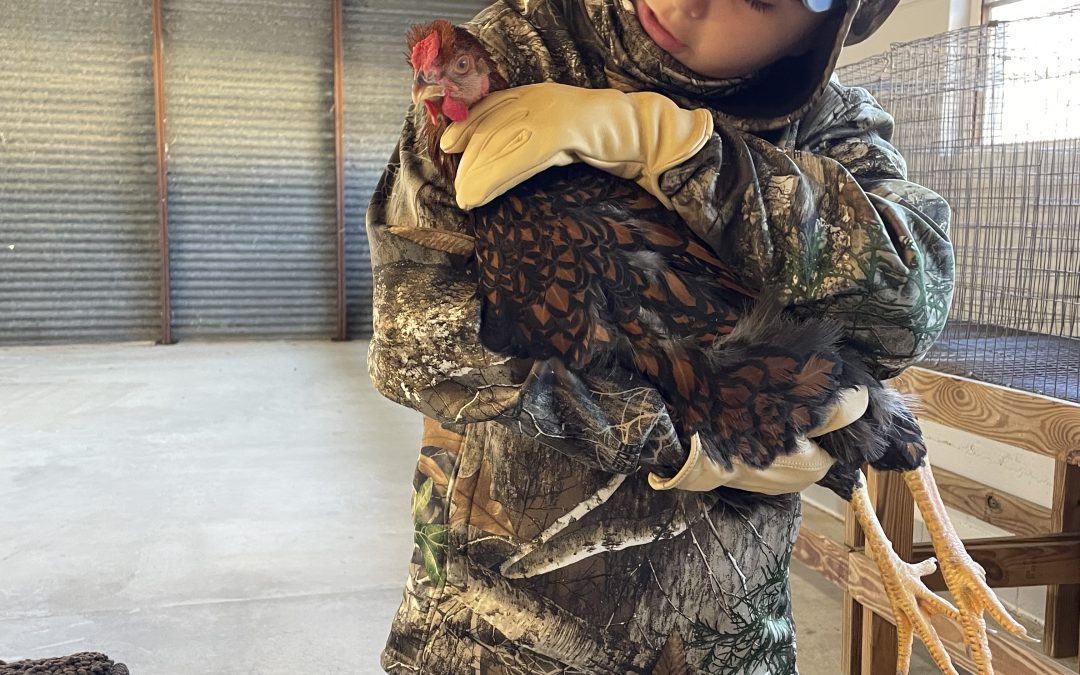
by Prudence Caskey | Jan 11, 2024
As we enjoyed a beautiful Christmas day in the panhandle, we need to start to brace for some colder weather as we welcome the new year. Here are a few ideas on how to protect your animals in the colder weather. During this upcoming cold snap, your “critters” will rely on you to survive it. As you think about how to best protect your outside pets and livestock, remember the three W’s. (more…)
by Prudence Caskey | Aug 31, 2023
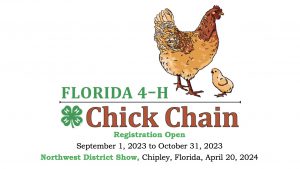
Who can participate in the NW District Chick Chain Project?
4-H Youth ages 5-18 from the Northwest District of Florida can enroll and participate in the NW Florida 4-H Chick Chain project. Those counties include Bay, Calhoun, Escambia, Franklin, Gadsden, Gulf, Holmes, Jackson, Jefferson, Leon, Liberty, Okaloosa, Santa Rosa, Wakulla, Walton, and Washington.
What is the Chick Chain project?
Join 4-Hers from our 16-county Northwest Extension district and learn how to raise and care for chickens. At the end of the project, there’s a district show where you’ll show off your birds and everything you’ve learned. This website will support you throughout your project. (more…)
by Julie Pigott Dillard | Mar 17, 2023
Over 50 4-Hers and over 100 chickens filled the barn and auditorium for the 2023 Northwest District Chick Chain show. The show was culmination of the seven month 4-H Chick Chain project.
At the beginning of the 4-H year, 4-Hers took ownership of day old chicks and began their journey in the 4-H poultry science project. They learned about poultry nutritional and housing needs, how to clean and show their birds, and how to perform health assessments. This program also encourages the development of life skills. Life skills are also known as workforce ready skills – skills that help individuals adapt to and perform in different settings.
Some of those workforce ready skills include:
- Communication – During the project, 4-Hers learned how to perform health checks on their birds. At the show, they conduct a health check for a judge. They explain to a judge how to perform the check, what they are looking for, and why a health check is important. 4-Hers could also choose to participate in Avian Adventures and give a presentation or demonstration on any aspect of poultry science.
- Problem Solving – 4-Hers participated in a skill-a-thon to test what they learned throughout the project. Senior 4-Hers were given scenarios to apply the best care and nutrition practices to meet the given situation.
- Work Ethic – Caring for an animal requires daily attention. 4-Hers fed and watered their animals daily, changed bedding, and prepared for cold temperatures to protect their birds. They also practiced their showmanship skills by frequently handling their birds to ensure they were tame.
- Reading and Mathematics – 4-Hers completed a record book at the end of their project. Their record books documented project goals, what they learned during the project, and animal care tasks. They also completed a financial record of expenses and income throughout the project.
At the show, all 4-Hers participated in poultry showmanship. First-time show participants and Cloverbuds participated in a skill-a-thon to test the knowledge and skills they learned in the project. 4-Hers who participated in last year’s Chick Chain show participated in Avian Adventures giving a presentation or demonstration on any poultry science related topic.
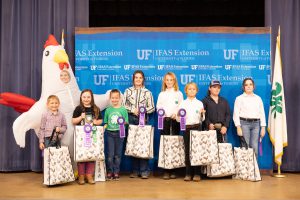
Best of Breed winners
2023 NWD 4-H Chick Chain Show Results
Best of Breed
- Australorp – Kolton Mercer
- Cochin – Emily Flowers
- Delaware – Tate Cannon
- Orpington – Olivia Bruan
- Plymouth Barred Rock – Tate Cannon
- Rhode Island Red – Henry Feinberg
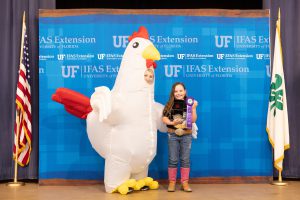
Laura Mae – Grand Champion Pullet
- Sussex – Lily McDaniel
- Wyandotte – Laura Mae Waters
Grand Champion Pullet – Laura Mae Waters
Reserve Champion Pullet – Henry Feinberg
Grand Champion Production – Audrey Stephens
Reserve Champion Production – Kolton Mercer
Showmanship
- 1st place Junior – Julia Newsome
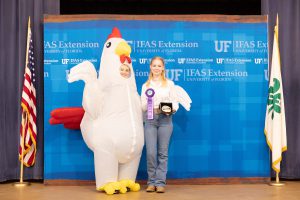
Audrey – Grand Champion Production
- 2nd place Junior – Jackson Scurlock
- 3rd place Junior – Kendyl Reams
- 1st place Intermediate – Julia Mashack
- 2nd place Intermediate – Emily Flowers
- 3rd place Intermediate – Emmit Ackman
- 1st place Senior – Steven Stafford
- 2nd place Senior – Roger Nemeth
- 3rd place Senior – Audrey Stephens
Skill-a-Thon
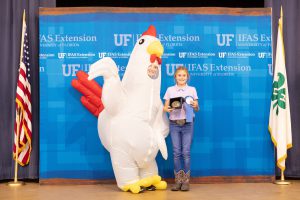
Julia – 1st place junior showmanship
- 1st place Cloverbud – Aubrey Mauldin
- 1st place Junior – Finn Feinberg
- 1st place Intermediate – Micah Houston
- 1st place Senior – JD Brookhouse
Avian Adventures Demonstration
- 1st place Junior – Allison Collier
- 2nd place Junior – Tate Cannon
- 1st place Intermediate – Kason Mercer
Avian Adventures Illustrated Talk
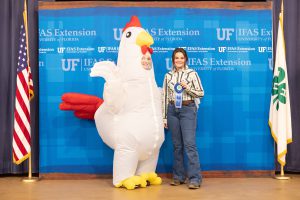
Emily – 1st Place Intermediate presentation
- 1st place Junior – Jocelyn Brock
- 2nd place Junior – Kadence Ackman
- 1st place Intermediate – Emily Flowers
- 2nd place Intermediate – Riley Bolling
- 3rd place Intermediate – Eli Howard
- 1st place Senior – Cat Proud
- 2nd place Senior – Roger Nemeth
- 3rd place Audrey Stephens
To all of our exhibitors, your 4-H Agents and 4-H club leaders would like to say “Great work” and that we enjoyed working with you this year! The 2023-2024 NWD 4-H Chick Chain program will begin in September. For more information, contact your county UF/IFAS Extension office.
A special thank you to Chris Lauen, UF/IFAS Extension Holmes County 4-H Agent, for capturing photos throughout the day. Click to view the entire photo gallery.









